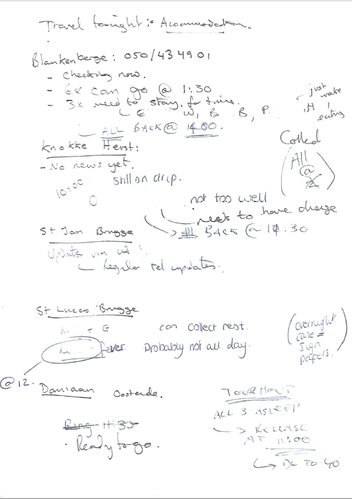As I have already noted, one of the most amazing parts of the whole experience was just how co-ordinated the emergency response was. As soon as we had established the condition of students in each of the seven hospitals I endeavoured to speak with each of the representatives from the emergency response teams: Red Cross, Police, Coastguard, Public Health, Youth Hostel and so on. In doing this I was able to work out what their remit was and therefore know which aspects of our case were being dealt with effectively. On the first night for example it was clear that our immediate medical needs were being addressed and that the physical needs of food and shelter for the well students were also covered. I was also able to establish that nobody would be checking on the status of students in hospital and of course no-one would be contacting school. We were therefore able to access the hostel’s phones and focus on these tasks, allowing the emergency services to deal with the rest. By midnight we had therefore communicated the situation clearly back to school.
On the Tuesday, further support was provided by the local police to coordinate returning students to the hostel and booking well students a crossing back to the UK with P&O. Again, this freed up time for staff to see to students’ more immediate needs such as eating breakfast and lunch and getting clothing and other items for them. It also gave us an opportunity to check all students still had their passports and other key documents.
School were of course vital in supporting us. When we lost two members of staff the previous night I requested and was given two support staff who came from England overnight to join us on the Monday. They also brought a car which was extremely helpful in visiting the students. Again, the choice seemed somewhat overkill at 7pm on Monday but by Tuesday morning I was extremely glad of the extra support.
The one recurring question I was asked by the emergency staff throughout was what I wanted to happen. We decided early on, after discussions with school, that our main aim was to get students home as soon as possible, as long as this was safe and in their best interests. Therefore, the decisions made by the emergency services helped us to achieve this long term goal. It is well worth considering what your long term goals are for a situation early-on, as this will determine many of your options. One example is that the coach company offered to drive us to a second crossing at Calais. However, as I was not convinced the driver was fit or safe to drive, I opted to spend the night in Belgium. As it turns out, the Calais crossing would have denied us access anyway, but here my overarching imperative for student safety and welfare overrode the possibility of getting them home sooner. It was, in hindsight, the correct call.

Of course there were also aspects where working alone was necessary too. This was particularly true on both days when it came to the insurance company. Although I contacted the insurance company very early on, they provided us with few solutions and communication was patchy. In the end I was through our own liaising with P&O terminal staff that a doctor was sent for and a youth hostel found in case we could not get a crossing to England. For vital aspects such as food, warmth and shelter, we often found it necessary to work with the people on the ground rather than waiting for insurance to help us out. On Monday evening for example we sent staff to a supermarket to buy food for all the students. Similarly, on Wednesday, I was able to secure special dispensation from the Belgian government to allow our last 4 students to fly home. I then sent these documents to the insurance company. This meant we were able to get an earlier flight home and return just 12 hours after the other 76 students.
There was also a period when the emergency response teams nearly all departed. Between 6am and 10am on Tuesday we were left with only the hostel staff. We therefore had to arrange our own transport for students returning from hospital. Again, the youth hostel staff were incredibly helpful and loaned us a minibus for staff to ferry discharged students back again. Other colleagues then took over the task of registering these students, getting them fed, and finding their personal belongings. Clear record keeping was vital here. Later, when the emergency teams arrived we were able to update them on exactly who was where. We continued to create shadow copies of the records so that we could communicate with school. This also meant that we could advise the Coastguard that we planned to take most of the students home by the end of Tuesday. This was then left to the Coastguard to arrange.
In all the chaos, making records is sometimes forgotten. We took great pains however to have a system of recording all details about each student and each hospital in clearly defined places. We also kept records of conversations with officials and plans. These were crucial when writing up my report of the incident afterwards, but also for keeping clear tabs on the unfolding events.
In addition to this, we were asked to make various statements to government officials about our itinerary and what we had eaten. This was important work, however we were able to ask the officials to wait until more important matters were dealt with. They were happy to allow us to leave and come back to statement writing, meaning that this was done slowly over the day. Completing it on the day was important however as they wanted a lot of detail about our activities.
Do bear in mind as well that any review of actions on the trip will be conducted a long way in time and place from the incident and therefore you will need to be able to explain your decisions as it will be difficult to relay the realities of the situation to people who were not there. Ideally get all your staff members to make an account of events as soon as possible and collate these along with all your other notes and documentation.
Dealing with the Press

Splitting the Group
One of the most difficult decisions was that of splitting the group. By 2pm on Tuesday it was confirmed that 4 students would remain in Belgium, 3 boys and a girl, and that the rest would depart at 4pm. We broke this news carefully to the group as a whole and ensured that all the students’ belongings were safe in the hostel. We then needed to delegate a member of staff to stay. We opted to keep one staff member in Belgium as 4 staff were still quite unwell and so more would be needed to look after the group of 76 returning home. As the first aider was already ill, it was decided that I should stay behind as I had been coordinating with the authorities already. I then made my way to update the four students about what was happening and to speak to their parents directly. In this respect protocols may have been somewhat bent, however we felt it was necessary to ensure that all were able to return home quickly.
Dealing with the Aftermath
To be honest this is probably the least of your worries by this point, but actually the whole process is quite physically and emotionally draining. I honestly could have wept as I handed over the last person to their parents. Make sure you give yourself plenty of time to rest and recover at the end of it all.
All in all, I would say, and the students have agreed with me here, that this was not a total disaster of a trip, despite the turn of events. Over the course of three days I saw so many acts of compassion and witnessed such dedication to the welfare of the students from all adults involved, that the overwhelming feeling was actually quite uplifting. Similarly the students were amazing; they dealt with everything as calmly as possible, supported each other, helped out where required and did everything asked of them.
Since our return, support from parents has been overwhelming. I think we are fairly sorted for chocolates and biscuits for the next ten years! One parent even commented: “I really hope that the teachers will not be put off from running the trip again, which B_____ has said was the best trip ever!!” Not only this, but since our return, a group of students themselves spontaneously organised a thank-you assembly and presentation for all the staff involved. It is moments like this that fill you with real pride - it was a miracle they didn't have a group of crying staff when the cards and gifts were handed over in front of the whole of Year 11.
Although I am not sure I would want to deal with a situation like this again, the whole experience did a lot to bring people closer together. Students too comment on their memories of deepening friendships and feeling part of a "trip family." At the end of the day, all of this has reminded me of why we run trips in the first place: to broaden students' experiences of life; to share some amazing history; and hopefully, just hopefully, to help them grow as people. I certainly feel we ticked all three boxes this time.

 RSS Feed
RSS Feed
